- Home
- Cynthia Ozick
The Din in the Head
The Din in the Head Read online
The Din in the Head
ESSAYS
Cynthia Ozick
* * *
HOUGHTON MIFFLIN COMPANY
BOSTON • NEW YORK
* * *
Copyright © 2006 by Cynthia Ozick
All rights reserved
For information about permission to reproduce selections from
this book, write to Permissions, Houghton Mifflin Company,
215 Park Avenue South, New York, New York 10003.
Visit our Web site: www.houghtonmifflinbooks.com.
Library of Congress Cataloging-in-Publication Data
Ozick, Cynthia.
The din in the head : essays / Cynthia Ozick.
p. cm.
ISBN-13: 978-0-618-47050-1
ISBN-10 0-618-47050-6
1. Literature, Modern—20th century—
History and criticism. I. Title
PN771.099 2006
809'.04—dc22
2005016102
NOTE: The essays on Helen Keller, Lionel Trilling,
and Gershom Scholem originally appeared in The New Yorker.
Illustrations © David Levme
Book design by Anne Chalmers
Typefaces. Janson Text, Deepdene, Type Embellishments
Printed in the United States of America
MP 10 9 8 7 6 5 4 3 2
* * *
For
Samuel and Rosie,
some day
* * *
Acknowledgments
I am grateful for the kind attention of the literary editors who welcomed these essays in their first incarnations; and I am especially indebted to Henry Finder, Leon Wieseltier, and Anne Fadiman.
My thanks also to David Levine, whose ingenious drawings punctuate these pages.
* * *
Contents
FOREWORD
On Discord and Desire
• [>] •
What Helen Keller Saw
• [>] •
Young Tolstoy: An Apostle of Desire
• [>] •
John Updike: Eros and God
• [>] •
Throwing Away the Clef: Saul Bellow's Ravelstein
• [>] •
Washington Square: So Many Absent Things
• [>] •
Smoke and Fire: Sylvia Plath's Journals
• [>] •
Kipling: A Postcolonial Footnote
• [>] •
Delmore Schwartz: The Willed Abortion of the Self
• [>] •
Lionel Trilling and the Buried Life
• [>] •
Tradition and (or versus) the Jewish Writer
• [>] •
Henry James, Tolstoy, and My First Novel
• [>] •
Highbrow Blues
• [>] •
The Din in the Head
• [>] •
The Rule of the Bus
• [>] •
Isaac Babel: "Let Me Finish"
• [>] •
In Research of Lost Time
• [>] •
The Heretical Passions of Gershom Scholem
• [>] •
And God Saw Literature, That It Was Good: Robert Alter's Version
• [>] •
AFTERWORD
An (Unfortunate) Interview with Henry James
• [>] •
* * *
* * *
Foreword
On Discord and Desire
WHEN SUSAN SONTAG DIED in the winter of 2004—at seventy-one, far too soon for her powers to have been exhausted or her intellect slaked—she left a memorable and mottled trail. Much of her life will endure in photographs—but cameras, she argued, do not so much defeat transience as render it "more acute." Still, here she is on the back cover of my browning paperback copy of The Benefactor.; a first novel published in 1963, when she was thirty: dark-haired, dark-browed, sublimely perfected in her youth. The novel, which reads like an audacious, sly, somewhat stilted translation from the French of a nineteenth-century philosophical memoir, ends with "a photograph of myself'—the self of the old narrator, who is contemplating his death. How distant death must have seemed to the young novelist then! In another photograph, dated 1975, she is lying on her back, hands under her head, with strongly traced Picasso eyelids and serene lips less curled than Mona Lisa's: beautiful at forty-two. Like any celebrity, she could be watched as she aged. Ultimately there came the signature white slash through the blackened forelock, and the face grew not harder but hardier (despite recurrent illness, throughout which she was inordinately courageous). She had a habit of tossing back her long loose hair when it fell, as it did from moment to moment, over her eyes: the abrupt shake of the head, once girlish, turned incongruous in the sexagenarian. She was tall and big-shouldered. She dominated any room, any platform; her voice was pitched low, mannish, humorous, impassioned, impatient. She was more than a presence: it was as if she had been inscribed in a cartouche—a figure who had, in effect, founded the culture in which she moved. And wherever she moved, the currents flowed with her.
Only her politics could not be said to be mottled: it was all of a piece, early and late, standard-issue and stereotypical: you could find its like in any university or elitist periodical in the Western world. Her politics, to which she gave so much of her vitality, some of it bravely (in Sarajevo), some of it reflexively (almost everywhere else), was, I think, the least interesting because the most commonplace part of her, though it ran deep and she valued it: it contributed to her celebrity and sometimes to her notoriety. But her celebrity was not her fame. Her fame erupted out of the publication in Partisan Review of "Notes on Camp," the 1965 essay that brought her instant recognition, in which she defined taste as the paramount contemporary aesthetic principle. "Taste," she wrote, "governs every free—as opposed to rote—human response. Nothing is more decisive. There is taste in people, visual taste, taste in emotion—and there is taste in acts, taste in morality. Intelligence, as well, is a kind of taste: taste in ideas."
With this manifesto she nearly single-handedly (though she soon had an army behind her) altered the culture. "The best that has been thought and said"—Matthew Arnold's exalted old credo, long superannuated—devolved to "Whatever." If taste governs all, then distinctions melt away, and the jihadist's "taste in morality" is no worse than mine or yours, and choosing life or choosing death comes down to chacun a son goût.
But set all that aside: it counts as politics, so let it go. The culture of art is where Sontag left her indelible and individual mark; and fame is when the individual becomes the general. As she prophesied in Against Interpretation, published in 1964,
All the conditions of modern life—its material plentitude, its sheer crowdedness—conjoin to dull our sensory faculties. And it is in the light of the condition of our senses, or capacities (rather than those of another age), that the task of a critic must be assessed. What is important now is to recover our senses. We must learn to see more, to hear more, to feel more.
This was less a summons to hedonism (though it was that too) than it was a denigration of history. The emphasis on "now," the quick dismissal of "another age," the repeated "our," the ardent call to see, hear, feel, meant that one would be open to seeing and hearing and feeling nearly everything that lay in one's path. It meant fusion rather than separation, it meant impatience with categories, it meant infinite appetite, it meant the end of the distinction between high and low. And the end of that distinction made a cut in the common understanding, so that Norman Mailer, for instance, could write of rampant subway graffiti by urban vandals as others had written of Bernini and Matisse. And oddly, oddly, oddly!—the newly elitist doctrine of "the
condition of our senses" came to resemble the "I know what I like" of the once-upon-a-time philistines and Babbitts.
The cut has been made; there is no going back. Yet Sontag herself did, in her final years, long to go back. At a symposium only months before her death, condemning the prevalence of "the idea that anything is better than anything else," she announced what amounted to a catchall self-repudiation: "It is the triumph of a pernicious relativism.... I am certainly not prepared to say the satisfactions derived by art are no different structurally, in content, or in quality, or in importance, from other kinds of satisfactions. I am not prepared to think that the satisfaction that I might get in front of a Chardin, a Vermeer, or a Vuillard, is in any way similar to the satisfaction I would get watching a beautifully pitched baseball or inspecting a shoe collection." And she reflected in a late interview that she wished she had written novels instead of the essays that had overturned public sensibility: she had since reawakened to the seductions of the novel in its traditional realist dress. The two novels that were her last were light-years from her first—in tone, in structure, in aspiration. The Benefactor has no beneficiaries, no literary heirs, either in Sontag's own work or in that of her admirers. But society at large is heir to the cultural rupture, the linked discordances, that she championed.
In Eden, desire came before discord: first the apple, then the expulsion. In earthly life, discord will often precede desire, and chaos may wildly roil before the advent of clarity. In the period of Sontag's greatest influence, when she had declared realism in contemporary fiction to be passé, when novels were to be lauded for the aridness of a stringent metaphysics, a deep discord descended, a choking chaos suffocated. Or, I should say, this is what happened to me. Perhaps I was too easily swayed, or too readily impressed, or simply too timidly willing to accept what seemed at the time to be an enduring cultural authoritativeness. Or else a prior eternity, what until then had always been seen to be eternity, was now being crushed and thrown all over the horizon in irrelevant shards. That eternity was the belief, now grown useless, in the impermeability of high art; it was whatever principles of discrimination had been esteemed before. And what had been esteemed before was surely not "pop." All this was noted in the press in the elegiac reports of Sontag's death. For The New Yorker, Sontag was "a central figure in the aesthetic bouleversement of that period: the absorption of pop culture into high culture, the abandonment of classical form for modernist fracture, the enthronement of the shattered consciousness in place of realism and morals and beginning-middle-end." The New York Times remarked that Sontag—for all that "the life of the mind was for her something both rigorous and passionate"—could nevertheless link Patti Smith and Nietzsche. Under the old eternity, no one would dream of linking Patti Smith and Nietzsche. Under the new dispensation, the old eternity evaporated, differentiation was dust, high culture was porous and always open to Patti Smith.
I did not know who Patti Smith was; there was much afoot that I did not know as I sat in my room with its yellow wallpaper reading Henry James and volumes of Jewish history and The Rise and Fall of the Roman Empire. Yet here I was, all at once, steeped in discord and chaos: oh, the novel, the novel! Authority was demanding that I cease to trust its familiar form, that its familiar form was broken forever, and that to continue to hope for it in the old way was to be exiled to the writer's ultima Thule; only the marginal and the mediocre and the weak would fail to recognize this. Authority had wiped me out. And where was I, after all, and what was I, while Authority and its enviable sharers and minions were exulting in the great red-hot Downtown? In my room with the yellow wallpaper, writing, in defeat, a superannuated, superseded, and moribund novel that was already fouled by the stench of its predictable death throes.
So when, years later, Susan Sontag recanted—and who could claim that The Volcano Lover was not a recantation?—I was amazed by my own shallowness. And cowardice. And surrender of conviction. I had been taken in, I had allowed discord to rout desire, and here was Sontag herself, unembarrassed, undisgraced, rising out of calculated and self-made discord to claim the very desire the yellow wallpaper had been witness to: the old eternity: the novel in all its worn human fallible genuineness, unembel-lished by critical manifestos. As if a movie were being run in reverse: Adam and Eve propelled from east of Eden back into the verdant Garden.
It was the shock of Sontag's death, of having to speak her name in the past tense—she was the tone of the times, she was the muse of the age, she was one with her century, and look, her century, our century, the terrible twentieth, with all its blood and gas and gulags and crimsonly sordid Riefenstahl aesthetics, has gone into the past tense too—it was her death that pricked these reflections upon long-ago excesses. Excesses of critical pride, excesses of writers' vulnerability and demoralization: all of it vanished into nullity. My private war with Sontag can hardly count as a war if she had no inkling of the vanquished foot soldier in the yellow room. Yet she was victor only until irony itself won out—after all, she did recant! And it may not be mere sophistry to suggest that irony, and its sardonically grim grin, is the outcome of all wars, big and little. It is still possible, against the grain of Sontag's torn banner, to read Nietzsche—and Gibbon and Jewish history and George Eliot and E. M. Forster and Chekhov and so much else—without at the same time taking notice of Patti Smith.
And because there is no public punishment for it (except for the with-it ire of this or that hostile periodical), it is still possible to separate high from low, the enduring from the ephemeral; even to aver that intellect itself (and the ethical life as well) requires the making of distinctions—sorting out, acknowledging that one thing is not another thing, facing down blur and fusion and the moral and aesthetic confusion of false equivalence, and, in the name of appetite for life, false worth. Not for nothing does the Bible rule against yoking the heavy ox with the lightweight ass, a nuance that points to cultural seriousness: honor and especially justice to the earth's plenitude of differences. The ass does not have the force of the ox. And as the ironist Kafka knew, the hunger artist in pursuit of Less does not really practice a superior art.
I cannot say that all the essays in this book are unified by a single theme, though I suppose (like the ass straining to keep up with the ox) I could laboriously invent one for the occasion. On the other hand, most—not all—may be connected by what they are not, what they do not do. By and large, they do not celebrate trivia or hunger after the lesser—not, I hope, out of some monomaniacal purist arrogance to which they are not entitled, but because some matters are, in truth, more urgent, and significant, than others.
Or perhaps there is a unitary wave running through these pages: the notion of desire, ambition's womb; desire applied to the kind of willed (or dreamed) achievement that outlasts personality; that is the opposite of taste, which is all personality. Or call it by the plain and ultimately discordant name that Henry James, remembering the expulsion from bright-leafed Eden, gave to his own desire: doubt. "We do what we can—we give what we have. Our doubt is our passion and our passion is our task. The rest," he said, "is the madness of art." What reader, coming upon these reverberating words, whether for the first or the tenth or the hundredth time, will not take them to heart?
What Helen Keller Saw
SUSPICION STALKS FAME; incredulity stalks great fame. At least three times—at ages eleven, twenty-three, and fifty-two—Helen Keller was assaulted by accusation, doubt, and overt disbelief. Though her luster had surpassed the stellar figures of generations, she was disparaged nearly as hotly as she was exalted. She was the butt of skeptics and the cynosure of idolators. Mark Twain compared her to Joan of Arc, and pronounced her "fellow to Caesar, Alexander, Napoleon, Homer, Shakespeare and the rest of the immortals." Her renown, he said, would endure a thousand years.
It has, so far, lasted more than a hundred, while steadily dimming. Fifty years ago, even twenty, nearly every ten-year-old knew who Helen Keller was. The Story of My Life, her youthful autobiograp
hy, was on the reading lists of most schools, and its author was popularly understood to be, if not the equal of Mark Twain's lavish exaggerations, a heroine of uncommon grace and courage, a sort of worldly saint. To admire her was an act of piety, and she herself, by virtue of the strenuous conquest of her limitations, was a living temple dedicated to the spirit of resurrection. Much of that worshipfulness has receded. Her name, if not entirely in eclipse, hardly elicits the awed recognition it once held. No one nowadays, without intending satire, would place her alongside Caesar and Napoleon; and in an era of earnest disabilities legislation, with wheelchair ramps on every street corner, who would think to charge a stone-blind, stone-deaf woman with faking her experience?
Yet as a child she was accused of plagiarism, and in maturity of "verbalism," illicitly substituting parroted words for firsthand perception. All this came about because she was at once liberated by language and in bondage to it, in a way few other human beings, even the blind and the deaf, can fathom. The merely blind have the window of their ears, the merely deaf listen through their eyes. For Helen Keller there was no partially ameliorating "merely." What she suffered was a totality of exclusion. Her early life was meted out in hints and inferences—she could still touch, taste, smell, and feel vibrations; but these were the very capacities that turned her into a wild creature, a kind of flailing animal in human form.
The illness that annihilated Helen Keller's sight and hearing, and left her mute, has never been diagnosed. In 1882, when she was four months short of two years, medical knowledge could assert only "acute congestion of the stomach and brain," though later speculation proposes meningitis or scarlet fever. Whatever the cause, the consequence was ferocity—tantrums, kicking, rages—but also an invented system of sixty simple signs, intimations of intelligence. The child could mimic what she could neither see nor hear: putting on a hat before a mirror, her father reading a newspaper with his glasses on. She could fold laundry and pick out her own things. Such quiet times were few. Frenzied, tempestuous, she was an uncontrollable barbarian. Having discovered the use of a key, she shut up her mother in a closet. She overturned her baby sister's cradle. Her wants were concrete, physical, impatient, helpless, and nearly always belligerent.

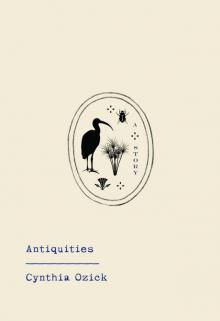 Antiquities
Antiquities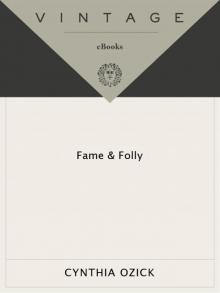 Fame & Folly
Fame & Folly The Messiah of Stockholm
The Messiah of Stockholm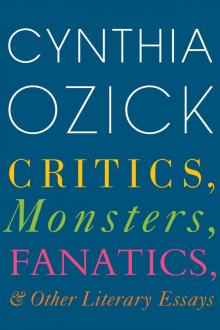 Critics, Monsters, Fanatics, and Other Literary Essays
Critics, Monsters, Fanatics, and Other Literary Essays Heir to the Glimmering World
Heir to the Glimmering World The Din in the Head
The Din in the Head Dictation
Dictation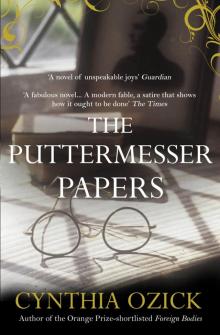 The Puttermesser Papers
The Puttermesser Papers Metaphor and Memory
Metaphor and Memory Art and Ardor
Art and Ardor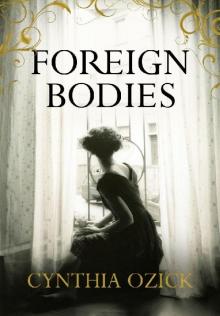 Foreign Bodies
Foreign Bodies Quarrel & Quandary
Quarrel & Quandary